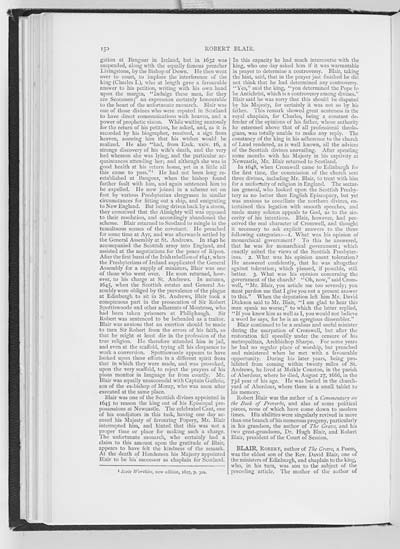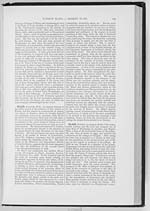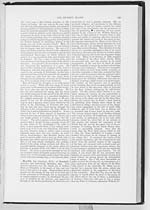150
gation at Bangour in Ireland, but in 1632 was
suspended, along with the equally famous preacher
Livingstone, by the Bishop of Down. He then went
over to court, to implore the interference of the
king (Charles I.), who at length gave a favourable
answer to his petition, writing with his own hand
upon the margin, "Indulge these men, for they
are Scotsmen;" an expression certainly honourable
to the heart of the unfortunate monarch. Blair was
one of those divines who were reputed in Scotland
to have direct communications with heaven, and a
power of prophetic vision. While waiting anxiously
for the return of his petition, he asked, and, as it is
recorded by his biographer, received, a sign from
heaven, assuring him that his wishes would be
realized. He also "had, from Ezek. xxiv. 16, a
strange discovery of his wife's death, and the very
bed whereon she was lying, and the particular ac-
quaintances attending her; and although she was in
good health at his return home, yet in a little all
this came to pass."1 He had not been long re-
established at Bangour, when the bishop found
further fault with him, and again sentenced him to
be expelled. He now joined in a scheme set on
foot by various Presbyterian clergymen in similar
circumstances for fitting out a ship, and emigrating
to New England. But being driven back by a storm,
they conceived that the Almighty will was opposed
to their resolution, and accordingly abandoned the
scheme. Blair returned to Scotland to mingle in the
tumultuous scenes of the covenant. He preached
for some time at Ayr, and was afterwards settled by
the General Assembly at St. Andrews. In 1640 he
accompanied the Scottish army into England, and
assisted at the negotiations for the peace of Ripon.
After the first burst of the Irish rebellion of 1641, when
the Presbyterians of Ireland supplicated the General
Assembly for a supply of ministers, Blair was one
of those who went over. He soon returned, how-
ever, to his charge at St. Andrews. In autumn,
1645, when the Scottish estates and General As-
sembly were obliged by the prevalence of the plague
at Edinburgh to sit in St. Andrews, Blair took a
conspicuous part in the prosecution of Sir Robert
Spottiswoode and other adherents of Montrose, who
had been taken prisoners at Philiphaugh. Sir
Robert was sentenced to be beheaded as a traitor.
Blair was anxious that an exertion should be made
to turn Sir Robert from the errors of his faith, so
that he might at least die in the profession of the
true religion. He therefore attended him in jail,
and even at the scaffold, trying all his eloquence to
work a conversion. Spottiswoode appears to have
looked upon these efforts in a different spirit from
that in which they were made, and was provoked,
upon the very scaffold, to reject the prayers of his
pious monitor in language far from courtly. Mr.
Blair was equally unsuccessful with Captain Guthrie,
son of the ex-bishop of Moray, who was soon after
executed at the same place.
Blair was one of the Scottish divines appointed in
1645 to reason the king out of his Episcopal pre-
possessions at Newcastle. The celebrated Cant, one
of his coadjutors in this task, having one day ac-
cused his Majesty of favouring Popery, Mr. Blair
interrupted him, and hinted that this was not a
proper time or place for making such a charge.
The unfortunate monarch, who certainly had a
claim to this amount upon the gratitude of Blair,
appears to have felt the kindness of the remark.
At the death of Henderson his Majesty appointed
Blair to be his successor as chaplain for Scotland.
1 Scots Worthies, new edition, 1827, p. 302.
In this capacity he had much intercourse with the
king, who one day asked him if it was warrantable
in prayer to determine a controversy. Blair, taking
the hint, said, that in the prayer just finished he did
not think that he had determined any controversy.
"Yes," said the king, "you determined the Pope to
be Antichrist, which is a controversy among divines."
Blair said he was sorry that this should be disputed
by his Majesty, for certainly it was not so by his
father. This remark showed great acuteness in the
royal chaplain, for Charles, being a constant de-
fender of the opinions of his father, whose authority
he esteemed above that of all professional theolo-
gians, was totally unable to make any reply. The
constancy of the king in his adherence to the church
of Laud rendered, as is well known, all the advices
of the Scottish divines unavailing. After spending
some months with his Majesty in his captivity at
Newcastle, Mr. Blair returned to Scotland.
In 1648, when Cromwell came to Edinburgh for
the first time, the commission of the church sent
three divines, including Mr. Blair, to treat with him
for a uniformity of religion in England. The sectar-
ian general, who looked upon the Scottish Presby-
tery as no better than English Episcopacy, but yet
was anxious to conciliate the northern divines, en-
tertained this legation with smooth speeches, and
made many solemn appeals to God, as to the sin-
cerity of his intentions. Blair, however, had per-
ceived the real character of Cromwell, and thought
it necessary to ask explicit answers to the three
following categories:�I. What was his opinion of
monarchical government? To this he answered,
that he was for monarchical government; which
exactly suited the views of the Scottish Presbyter-
ians. 2. What was his opinion anent toleration?
He answered confidently, that he was altogether
against toleration; which pleased, if possible, still
better. 3. What was his opinion concerning the
government of the church? "Oh, now," said Crom-
well, "Mr. Blair, you article me too severely; you
must pardon me that I give you not a present answer
to this." When the deputation left him Mr. David
Dickson said to Mr. Blair, "I am glad to hear this
man speak no worse;" to which the latter replied,
'' If you knew him as well as I, you would not believe
a word he says, for he is an egregious dissembler."
Blair continued to be a zealous and useful minister
during the usurpation of Cromwell, but after the
restoration fell speedily under the censure of his
metropolitan, Archbishop Sharpe. For some years
he had no regular place of worship, but preached
and ministered when he met with a favourable
opportunity. During his later years, being pro-
hibited from coming within twenty miles of St.
Andrews, he lived at Meikle Couston, in the parish
of Aberdour, where he died, August 27, 1666, in the
73d year of his age. He was buried in the church-
yard of Aberdour, where there is a small tablet to
his memory.
Robert Blair was the author of a Commentary on
the Book of Proverbs, and also of some political
pieces, none of which have come down to modern
times. His abilities were singularly revived in more
than one branch of his numerous progeny, particularly
in his grandson, the author of The Grave, and his
two great-grandsons, Dr. Hugh Blair, and Robert
Blair, president of the Court of Session.
BLAIR, ROBERT, author of The Grave, a Poem,
was the eldest son of the Rev. David Blair, one of
the ministers of Edinburgh, and chaplain to the king,
who, in his turn, was son to the subject of the
preceding article. The mother of the author of

![]() Universal Viewer |
Universal Viewer | ![]() Mirador |
Large image | Transcription
Mirador |
Large image | Transcription
![]()

